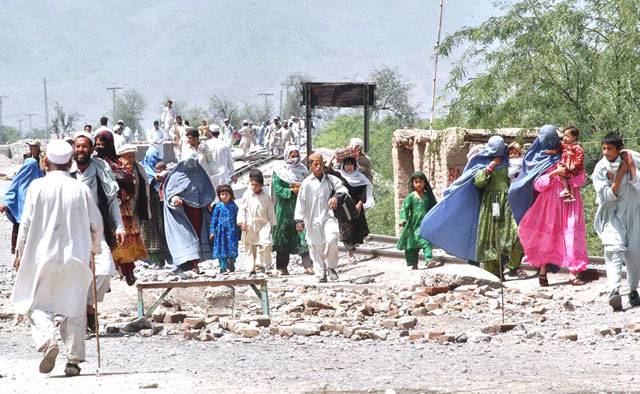ISLAMABAD - After getting the go- ahead nod from the coalition Government the Military leadership had brought about a major shift in their ongoing policy on 'military operation against the militants in Tribal Areas' and turned to the negotiation table from the battlefield. The sources privy to these developments disclosed to The Nation that after the successful brokering of the truce in North Waziristan the Military leadership had entered into negotiations with the tribal elders in South Waziristan mainly inhabited by the Mahsud and Wazir tribes. It was further disclosed that the whole exercise was also having the partial blessings of the Americans, the main players in the ongoing international war on terror, as the American leadership had told the Pakistani leadership that they would not oppose if the Pakistan Government would go for the negotiations with Taliban to bring peace to the troubled Tribal Areas, except a few fugitives required by the United States in connection with the intercontinental acts of terrorism. In the maiden briefing on the role of Pakistan in international war on terror and ongoing military operation in Tribal Areas, given to the political leadership a couple of weeks back in Prime Minister House, the Chief of Army Staff Gen Ishfaq Pervez Kiyani along with top military operators had sought the support and suggestions from the political leadership to handle this issue turning into a chronic problem. Now after the detailed deliberations on the subject, of course after taking American leaderhip into confidence, the political leadership had given a green signal to the Military leadership to go for dialogue with the men in mountains and look for the other options to bring peace to these troubled areas. In North Waziristan a peace accord had already been made with the militants and Tribal elders were engaged in the negotiations to broker a permanent solution to the problem while in South Waziristan too the negotiations were afoot to reach a similar truce to pave the way for the broad-based negotiations to get permanent solution to the problem. The sources in the government disclosed to The Nation that it was further decided by the political and Military leadership of the country that in future all the matters pertaining to the Tribal Areas and the ongoing military and peace initiatives would be tabled before the authority comprising President of Pakistan, Prime Minister and the Federal Cabinet, and the decision would be taken unanimously. Earlier, all the matters pertaining to Pakistan's role in the ongoing war on terror were solely decided by the President and Military elite, and nobody else was taken on board. Now in the new arrangement the matter would be tabled before the authority, comprising President, PM and Federal Cabinet, and obviously the political leadership would have a leading role. In the meeting held between PPP Co-Chairman Asif Ali Zardari, PML(N) Quaid Mian Nawaz Sharif and ANP President Asfandyar Wali a couple of days back besides the core issue of restoration of the superior courts' judges the issue of tackling the Tribal Areas unrest also came up for a detailed discussion and all the three leaders were unanimous in their view that the solution to the problem was embedded in negotiations and military option should be taken as the last resort. The sources further said that after the meeting the Military leadership was given the green signal to adopt the negotiations course to carve out a solution to the problem. The sources informed that Pakistan Army was in the process of roping in all the militant groups fighting in various parts of the Tribal Areas in negotiations and the result of the endeavour was encouraging. In North Waziristan a complete ceasefire was achieved and the Tribal elders were successfully brokering the modalities of the permanent solution to the area while similar type of parleys were also going on in Mohmand and Bajour Agencies. In South Waziristan too the Tribal elders of Wazir Tribe led by Mollana Nazir had brokered ceasefire and were ready to enter into dialogue with the authorities while the authorities were facing a little difficulties in handling the Mahsud Tribe led by their leader Baitullah Mahsud, whom Americans considered their arch-enemy in the area. The sources in the Government disclosed that Baitullah Mahsud too had approached the political leadership of the country to clarify his position regarding his implication in the assassination of Ms Benazir Bhutto by the previous Government. Meanwhile, to deal with the sectarian clashes in Swat, Khyber and Khurram Agencies both the Federal and NWFP Governments were engaged in negotiations at some other level to bring peace to these areas as well.
Thursday, April 25, 2024
Army alters strategy, turns to negotiations

No country ready to invest in Pakistan: Omar Ayub
8:36 PM | April 25, 2024
Army Commanders pay tribute to martyred customs officials
8:34 PM | April 25, 2024
Cabinet approves ban on use of 'national' in names of private companies, institutions
8:33 PM | April 25, 2024
Supreme Court orders auction of Nasla Tower land, compensation for affected allottees
7:52 PM | April 25, 2024
Pakistan dismisses 'unfair' US human rights report
7:49 PM | April 25, 2024
Academic Uprising
April 24, 2024
Cooperation Momentum
April 24, 2024
Facing Reality
April 24, 2024
Absent Academia
April 23, 2024
Murree’s Redemption
April 23, 2024
Ending animal suffering
April 25, 2024
AI governance
April 25, 2024
AI concerns
April 25, 2024
Population paradox
April 24, 2024
Unveiling differences
April 24, 2024
ePaper - Nawaiwaqt
Advertisement
Nawaiwaqt Group | Copyright © 2024





